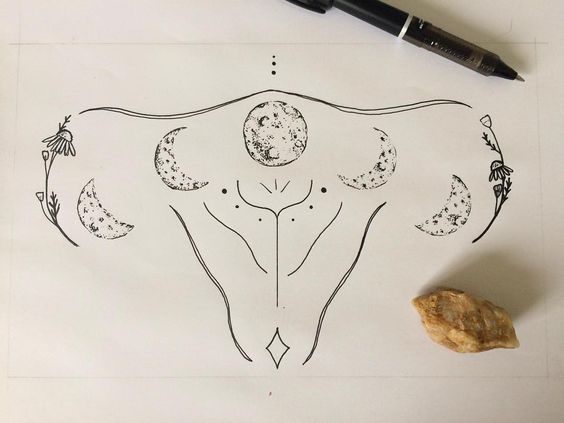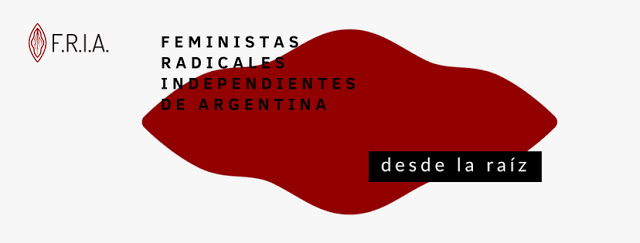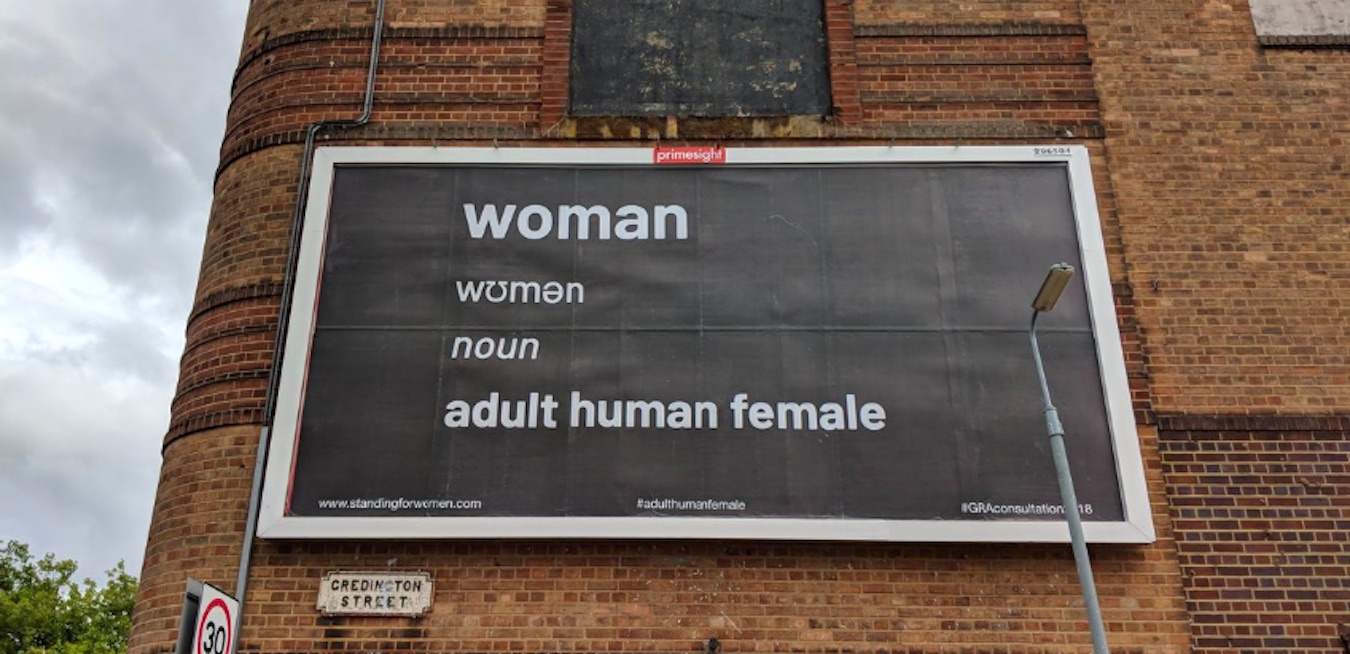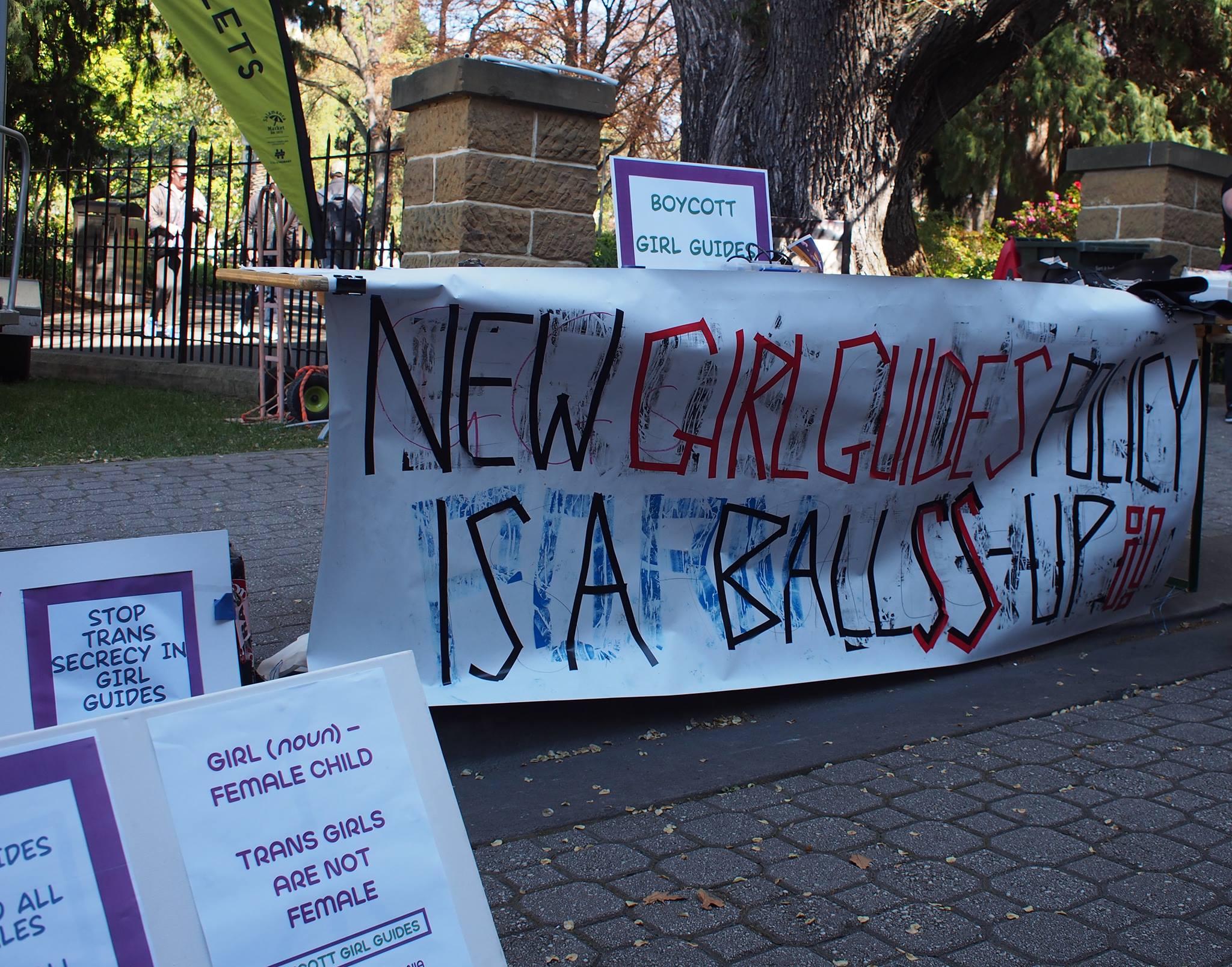
by Deep Green Resistance News Service | Apr 6, 2019 | Male Supremacy
Featured image: screenshot of a video taken of transactivists assaulting women at a presentation in Buenos Aires, Argentina. See video link below.
by Luis Velázquez Herrera / FRIA (Independent Radical Feminists of Argentina)
In Buenos Aires, Argentina, a group of radical women are about to speak in the middle of a crowd at the assembly “Ni Una Menos” (Not one more woman) that took place anticipating preparations for the coming March 8th, you can listen to the noise and a unison shout against them to “go away!”
There is a man standing beside them yelling with a defying fighting pose, pointing at them aggressively. He is dressed in a plaid miniskirt and white shirt. He is far taller than the average women present.
From the multitude of radical women that are preparing to speak, a woman with a calm expression appears, she wears a black blouse and short hair, asks for the microphone: “Freedom of speech, female partners, freedom of speech”!
Her name is Ana; she knows she is unwelcome, as are her partners from FRIA/Feministas Radicales Independientes de Argentina (Independent Radical Feminists of Argentina) and RADAR Feministas Radicales de Argentina (Radical Feminists of Argentina). They are attending what they thought was a democratic assembly to present their abolitionist stance against sexual exploitation. The man dressed in a miniskirt, who hasn´t stopped threatening them through shouts and flinging fists in the air, throws himself over her to take away the microphone.
Surrounding women stopped him and took him away. They defend themselves. A woman wearing a yellow jacket stands out and drives him away vehemently. She is thin and short in contrast to him. You can see in her face the fury for survival, the rage of knowing she is being invaded, and the rest of the radical women act with her. You can see many women stopping the hands of the man. They know he is a man, even though he claims vocally to be otherwise. He has invaded them and they stop him.
In a feminist assembly, women would take out the violent man in a shout for self-defense, protecting the women being harassed. Very likely, they would make a complaint to set a criminal record against a potential woman-killer and would continue talking about immediate and future security for harassed women, and all women.
But this does not happen. It is February 15, 2019. Three decades ago feminism, in the dawn of neoliberalism, changed from being about and for women to caring for aggressors and covering up pimps—in general, to protect men. Because of this, harassed women are forced to abandon the venue, being booed by the public. Nobody will protect them or even consider their safety. Nobody but themselves will take a stance against that violence; they will withdraw, scared, hurt, damaged by the support that other women gave (in a self-proclaimed feminist assembly) to a man harassing women. I found the name of the name of that woman in social media, who, in spite of the hooting crowd, came out to speak calmly before being physically attacked. Her name is Ana Marcocavallo, 43 years old, psychologist and professor in pedagogy. She lives in Buenos Aires and is a radical feminist who forms part of FRIA/Feministas Radicales Independientes de Argentina, we had a phone interview and chatted.
I´ve read what happened, are you okay?
At the moment it was quite terrible, emotionally, physically and politically…
Did you attend as member of a group?
I am part of an organization called FRIA, but at that moment various groups attended, FRIA, RADAR, Abolicionistas Independientes (Independent Abolitionists), and if I’m correct, Mujeres Autoconvocadas (Self-summoned Women) among many.
How did you arrive to Radical Feminism?
I followed the typical path many do to feminism, arriving through mainstream feminism, liberal feminism. I got to radical feminism fairly recently, only four or five years ago, which was due to fellow feminists who taught me, who gave me readings, which honestly, I read reluctantly. In that way I discovered a new world where I felt that all the ideas I had myself, and which I discarded as wrong, had a place and there were more people who thought like I did.
How has it been to organize as Radicals?
Honestly, it was difficult. At the beginning there were many radicals spread afar, placard radicals [closet radicals] so to say. It was important to find each other as fellow mates, first with small groups to then realize that these groups grew or that other small groups, with which we could coordinate, existed. But by small groups I´m talking of very small groups. For example, some groups from a whole province would only have two members. Currently, we are organized through a WhatsApp group of Radical Feminists from different provinces and the capital, from different gathering groups, a little of everything, and through that group we are discussing things, organizing, generating a tighter Radical Feminist nucleus. At least now we know others are around, even though we might not agree on all our contents.
Through social media we are in contact with radical feminists from México, Uruguay, Paraguay, Spain, US, UK… and we can see that in those countries they are living the same as we are, an advance of Liberal Feminism, which is made up of a combination of ideas like Queer Theory, transactivism and legalization of prostitution, things you won’t see in other countries. I believe that in Argentina, we live a weird case, other countries have told us, where people who are trans, drags and transactivists are also prostitution abolitionists, which you will never find in other countries.
This is how historical reality is marking us through “transfeminines” who have been building the abolitionist movement, who have left us with disputable laws regarding gender definitions, but what I believe is that these theories go hand in hand, prostitution legalization is leading transactivism and Queer Theory, who breaking a split within the abolitionist movement.
The fact that some people with radical ideas who were also trans or drags or that reified that identity, generated a kind of strategic unit where feminist women that preceded us renounced to some matters. For example, the Ley de Identidad de Género (Gender Identity Law) in Argentina, which turned out to be an incredibly deceitful law.
Why an assembly called “Ni Una Menos” (Not one more woman) has among their members people that favor sexual exploitation and are pro-transactivism?
Precisely, it is paradoxical. Basically, the problem lies in that Ni Una Menos in Argentina is in favor of legalizing prostitution and adopts a Liberal Feminist stance. As such, us abolitionists, we fight for our spaces and are being cornered, to the point we do not know if it is convenient for us to go after those particular spaces or try to generate new ones.
How does the phenomenon of the Green Wave and these last happenings relate?
The Green Wave is specifically a fight for legal abortion, for it to be safe and free. What happens within feminism is the occurrence of strategic units, where we are united by basic principles but differentiated by others. In this case, the Green Wave has such populous numbers because all sectors offer support, pro-legal prostitution, abolitionists of prostitution, Radical Feminists and Liberal Feminists.
That does not happen in Mexico, we never prefer to march next to Liberal Feminists under any circumstance….
Of course, what happens is that just by numbers, Radical Feminists cannot lose the chance to march with them but we march separately. It is like throwing wood to a fire, it does us no good, politically speaking, because in this moment we are being isolated, followed and threatened by liberal feminism, the kind of feminism that does not think like we do, which means, the greater majority.
What would you say to a feminist in the effort of understanding what transactivism is?
Transactivism is difficult to explain, but what we dispute is not the existence of trans people—we are not in favor of the annihilation of trans people, what we are accused here in Argentina, where we get compared with Nazis—but that our struggles can converge in some point. Meanwhile in other points, when they oppose radically against feminism, we will never accept them passively as machismo has always imposed over us women.
And those matters are the redefinition of what being a woman, where we are not allowed to define ourselves as women, which is what patriarchy has always done, it has told us “women are that which are not men,” and now it turns out that we are “cis-women,” the “women that are not trans,” that is what we are discussing now.
We argue against the current definition of gender, from the transactivism vantage, it is defined as “identity.” We have a vision of gender as oppression, oppression by material causes, not merely ideological. From transactivism’s vantage point, gender is the cause of oppression. We think that gender itself is the oppression. These theoretical differences are interpreted by transactivism as a denial of their identity, but basically it is a tautology to believe that “women are women,” that “women’s day is women’s day.”
We do not deny their existence, nor their struggle or problems. What we deny is that their problems comingle with ours, to have our spaces colonized, and of course, that they hetero-define us, which is to say, that we cannot define ourselves by ourselves, because that erases us as political subjects, and if women are troubled by something, it goes beyond countries and specific problems, and it is precisely that we are women and that we have particular pains and pangs for being born with determined genitals.

Drawing by Amanda Dziurza
And how would you explain abolitionism?
For me, abolitionism was one of the gateways to radical feminism. Radical Feminism is abolitionist by nature, however, not all abolitionists are Radical Feminists, because to begin with, not all abolitionists are feminists. It is a weird phenomenon, but that is how reality works.
Abolitionist feminisms, as I understand it, is the feminism that opposes rape culture and prostitution culture. Prostitution is seen as rape; simultaneously, pornography is understood as the educational method for prostitution and rape.
We are accused for being against the prostitution system, meant as normalization of men’s will and capacity to do to women’s bodies whatever they wish to, privately, through marriage, or publicly, through any other media or means, rape for pay, is that we are moving against prostituted women and their rights, which is false, a fallacy, a misrepresentation. In the same way as radical feminists, we are against a definition of gender by transactivism. And we are accused of being against trans people, the cause of their sufferings, their murders, and so on, which ignores that the perpetrators are men and not us feminists.
Under this stance it is that the assembly Ni Una Menos, asked you to present ourselves as an abolitionist block rather than Radical Feminists.
I asked him to present us as cold, RADAR, nothing more, and they present us as radical feminists, so right there the situation that will not let us talk arises, encouraged by Georgina Orellano who shouted at us “TERFs, TERFs, TERFs!” Georgina as you know is the most visible faces of AMMAR, which is the group that carries out regulationism, the pro-pimping.

It wasn´t that long ago that I saw some member of AMMAR with legal complaints for prostitution…
They have complaints for prostitution and even several of them remain under legal process. And precisely, many of the stances they present themselves with is to attack the Anti-Prostitution Law that has taken us so many years to obtain. One of our requirements is that the Anti-Prostitution Law is inviolable.
And even when they are marked by prostitution complaints they still receive support?
Yes, because there is a lot of misrepresentation going on, extortive appeals to the feminine socialization that we must embrace at all costs, we feel guilt that we are the sole root cause, we feel guilt to have exclusive spaces, so we have to adhere to all other causes, because otherwise, it will be our fault they are discriminated, it is our fault they suffer. Dialogue is channeled that way.
So you get up there to speak with other fellows of the assembly Ni Una Menos…
There were many of us, we were eight women, they snatched the microphone from my hands, and started chanting so that we would not be allowed to speak. There were some women asking “let them speak, I am not in agreement with them, but they must have the right to speak,” at some point I got the microphone back. The turmoil was loud, and I stepped ahead and shouted “Freedom of speech, women, freedom of speech!” so that I could read my plea and following me my fellow team from RADAR their own pleads. At that moment, I´m not sure to say if it was or not a transfeminine, or a person self-considered binary, I can´t tell, but he started an attack against me which was stopped by my friends.
Practically, he threw himself to punch you, did he hit you?
Luckily no, first he grabbed me by my t-shirt neck and supposedly was trying to snatch the microphone with the other hand, but he had the attitude that he was about to punch me, so I pushed him backwards. I swear, I reconstruct the moment through the videos from all perspectives, because honestly at that moment a fellow woman mate grabbed him from his back and pulled him, and from what I see, he also throws punches against her, that luckily don’t reach her, because surely because other people from other groups were transactivists, recognized his strength and threw him to the ground. It seems to me of extreme severity that the whole assembly shouted supporting support for transactivism after a women or many might have been punched. And it is incredibly severe that, not only he attacked me, but that he tried to punch a minor.
After this moment, what happened? Did you leave?
After this this moment in the assembly there were many people that tried to intervene for us, so that we had our right to speak, some fellow members would dissuade me, “come on, come on” but I said “no, we will stay, we will not go down.” Many people intervened, but told us, “no, there is no solution.” A representative of Ni Una Menos, took the microphone, spoke instead of us, against us. Georgina Orellano also spoke against us asking that we should not get the microphone, that we should not be allowed to speak. They insisted that we left, I said again no, that we would speak, and well, the third time my fellow members told me to leave, realized there was no solution, not to say that the supposedly democratic assembly was expelling us, and that we needed security because there were women, some very young, minors, and nobody listened. It could have gone much worse. When we left, we did it alone, by ourselves with very young members, but nobody of NUM guarded our security, and there was no communique, nobody talked about it, it was made invisible. This got to social media by our own complaints.
I read that the comments that insulted the radicals were directed mostly against young women, was this so?
No, liberals are also very young. Last year a historical feminist of abolitionism called Raquel Diselfeld was among the few that were with us in the middle of the turmoil. For example, she talked on the assembly of sexual liberty for women, pleasure, orgasms, she talked about how this has nothing to do with prostitution and she was booed by a bunch of girls who were not even yet born when this woman was already fighting for our rights, which means, that not only young feminists are in radical feminism, they are in all kinds, and fortunately the youngest of them are mobilized by general feminism, radical and liberal feminism. It is a time when young women are acquiring a level of consciousness that when we were of their young age didn’t have.
When you attended the assembly of Ni Una Menos could you foresee the attack?
We did foresee that something like this could occur. We always remain optimists, to strive for the best, that is to say, that we would be prevented from speaking and that we would have to withdraw.
During this week and the previous one, a kind of social media war was held against us, where many venues published notes that I consider terrible apologies for crime; for example, a news server called Página 12, asked for organizations that are contrary to radical feminism or that don’t manifest any posture, to abandon their tepidness and attack us.
And during these two or three weeks many articles of political parties misrepresented our posture and in social media there were many attacks and threats, even to set us on fire or break the teeth of radical feminists.
One always takes it with good spirit, the things that happen on the internet, everybody blathers on social media, but nobody is direct. I would at least consider that there would be somebody that would consider it literally and in effect that was what happened. We tried to get there the most possibly organized in our security to avoid this kind of things, but we did not expect that it would spread with such virulence and particularly, with such approval from organizations like Ni Una Menos as did the rest of the assembly.
Did you know the aggressor? Had he threatened you before?
I did not know him, but some members of RADAR noticed that this person was taking pictures of them.
So, how did you feel? How do you feel now?
Honestly, what I think now is I’m glad it did not escalate, it could’ve been much worse, I could’ve been injured if it wouldn’t have been for the intervention of my fellow companions that exposed themselves way too much, but it didn’t get any worse by miracle.
At this moment, I am hurt, emotionally fatigued, very tired, in this moment I feel personal desolation because the whole abolitionist block to which we belong, is not repudiating a violent physical action against a fellow woman, even though it would have or not been me. It establishes a very serious precedent that we do not repudiate a violent action against a woman in spaces that should be safe, we are seen as hate speech, meanwhile we would never intend or even occur to punch a person, trans or transactivist or woman transactivist, queer or even women against women’s rights, like those that are against legalizing abortion. We have never done it and never will, what we have suffered are threats and physical violence.
Let me understand you, liberal feminists have not repudiated the violence, but neither abolitionists have positioned themselves against the violence you lived through?
A letter for general repudiation has been prepared, and it has been signed by too few, the majority of signatures come from radical feminists, we are helping ourselves, but we are not having the slightest help of the Argentinian abolitionist block, we are receiving support from the rest of the world, as I said, US, UK, Mexico, Uruguay, Chile … but basically in Argentina we are not receiving enough support, and that truly breaks my heart.
What is your analysis of this situation?
I believe that the general objective of the attack was an excuse for legalization of prostitution adherents to blame radical feminists of breaking the abolitionist block, just as is happening now. There is a part of abolitionism that does not want to be related with our posture. We are not telling them to adhere to our posture, but simply to repudiate the physical attack.
It seems like bullying in school, a boy bullies another boy and there is a reaction of the bystanders like a great public that also engages in a passive way, because that way they avoid being the attack target. I believe the situation is like this or at least I understand it this way.
Regarding yourself, what follows next? How are you coping with all of this?
I am currently keeping out of the streets for a week, I need protection, I won’t go out with other people, at least for a week. There are actions I cannot participate in, for example next Tuesday there will be a meeting pro-choice to which I will not be able to go, so that my face is not recognized and to avoid other situations. As I said before, I work in institutions of pedagogy sponsored by the city government. So if I say something or they say I said something against the Gender Identity Law (which states that any person has the gender with which they themselves self-designate, without any other norm or explanation, simply put, I call myself a man and I am a man, I do not even have to change my dress code), the situation would be dangerous for me, I could lose my job.
I had to go through something like that, some transfeminine summoned men to find my address and attack me, luckily they didn’t, but I understand, it is a tough situation, a hard emotional punch…
Exactly, it’s a situation to fear, if you really have to yield to getting silenced.
It is a tactic of these people, I believe we have to take some time for ourselves, but what they can’t predict is that we continue in dialogue with other women.
I believe that all we can do is create alternative spaces and to continue honest theory and spread it, but by some way it is as if we were mute, the prejudice is so big that we will not be heard.
Editor’s note: Feminist Current’s Raquel Rosario Sanchez also interviewed two members of (FRIA), Maira and Ana; read this interview here.

by Deep Green Resistance News Service | Nov 22, 2018 | Repression at Home
I don’t want to choose between the left and the right, I want to engage in critical thought, challenge myself, and form my own opinions.
by Meghan Murphy / Feminist Current
In August, I was locked out of my Twitter account for the first time. I was told that I had “violated [Twitter’s] rules against hateful conduct” and that I had to delete four tweets in order to gain access to my account again. In this case, the tweets in question named Lisa Kreut, a trans-identified male, as the individual who targetedFeminist Current’s ad revenue and led efforts to have Vancouver Rape Relief blacklisted at the 2016 BCFED Convention.




I deleted the tweets in question, then publicly complained on Twitter, saying, “Hi @Twitter, I’m a journalist. Am I no longer permitted to report facts on your platform?” I was promptly locked out of my account again, told I had to delete the tweet in question, and suspended for 12 hours. I appealed the suspension, as it seemed clear to me that my tweets were not “hateful,” but simply stated the truth, but received no response from Twitter.
On November 15th, my account was locked again. This time, I was told I must delete a tweet from October, saying, “Women aren’t men,” and another, asking, “How are transwomen not men? What is the difference between a man and a transwoman?”
After dutifully deleting the tweets in question in order to gain access to my account again, I tweeted, angrily, “This is fucking bullshit, @twitter. I’m not allowed to say that men aren’t women or ask questions about the notion of transgenderism at all anymore? That a multi-billion dollar company is censoring basic facts and silencing people who ask questions about this dogma is insane.” This tweet went viral, racking up 20,000 likes before Twitter locked my account again on Monday morning, demanding I delete it. This time they offered no explanation at all — not even a vague accusation of “hateful conduct.”


To be fair, it’s not that insane. Multi-billion dollar companies are clearly primarily interested in profit, not free speech or women’s rights. But Twitter is a company that represents itself as a platform for communication, for debate, and for sharing ideas, news, and information. While of course, as a private company, Twitter has the right to limit who participates on the platform and what is said, we, the public, have become accustomed to understanding this social media platform as a relatively free space, wherein everyone from politicians, to celebrities, to pornographers, to activists, to students, to anonymous gamers, to feminists, to men’s rights activists may say what they wish.
Despite my disinterest in seeing graphic pornography on Twitter and in being called a “TERF cunt” who should “drink bleach,” I accept that this is something I am likely to be exposed to on Twitter, and choose to use the platform anyway. Cruel and graphic comments are things, for better or for worse, I am accustomed to and that, frankly, don’t bother me much at this point. If you are a public figure, you do just get used to this kind of thing.
What is insane to me, though, is that while Twitter knowingly permits graphic pornography and death threats on the platform (I have reported countless violent threats, the vast majority of which have gone unaddressed), they won’t allow me to state very basic facts, such as “men aren’t women.” This is hardly an abhorrent thing to say, nor should it be considered “hateful” to ask questions about the notion that people can change sex, or ask for explanations about transgender ideology. These are now, like it or not, public debates — debates that are impacting people’s lives, as legislation and policy are being imposed based on gender identity ideology (that is, the belief that a male person can “identify” as female or vice versa). That trans activists and their allies may find my questions about what “transgender” means or how a person can literally change sex uncomfortable, as they seem not to be able to respond to them, which I can imagine feels uncomfortably embarrassing, feeling uncomfortable is not a good enough reason to censor and silence people.
As a result of these attempts by Twitter to silence me, the right has leapt to support me, or at least engage with me, and criticize Twitter’s nonsensical, unwritten policies (nowhere in their Terms of Service does it say users may not differentiate between men and women or ask questions about transgender ideology). While the left continues to vilify me, and liberal and mainstream media continue to mostly ignore feminist analysis of gender identity, people like Dave Rubin and Ben Shapiro (and hundreds of right wingers and free speech advocates online), and right wing media outlets like the Daily Wire and The Blaze have either attempted to speak with me and understand my perspective, expressed support, or covered this undeniably ridiculous decision on the part of Twitter.
Anger at Twitter’s now ongoing attempts to silence me (I remain locked out of my account, awaiting an appeal process that is likely to result in nothing, and received a second notice today that I have been locked out doubly, on account of a tweet posted in May, criticizing Lisa Kreut for participating in a smear campaign against a local feminist, anti-poverty activist. Kreut has publicly admitted to “knowing someone” at Twitter Safety, so this is unsurprising, perhaps, albeit disconcerting) is not limited to the right or to free speech advocates, of course. There are numerous feminists around the world and unaffiliated members of the general public who see transgender ideology as dangerous (or simply ridiculous), and are critical of the ongoing silencing and smearing of those who challenge it. But one thing that does seem undeniable to me — something that the left should consider carefully, in terms of their own political strategizing — is that while the left seems to have taken to ignoring or refusing to engage with detractors or those who have opinions they disagree with or don’t like, the right continues to be interested in and open to engaging. And I think this is a good thing.


In light of my years of negative experiences trying to engage progressives on issues like pornography, prostitution, male violence, and now gender identity, I’ve unfortunately come to see many of them as cowardly, hypocritical, lacking in political and intellectual integrity, and disingenuous. While of course there are leftists who are critical of the sex trade and trans activism, far too many of those who represent progressives (in North America, in particular) — politicians and leftist political parties, as well as activists and representatives of the labour movement — will not speak out about these issues nor will they defend the women being ripped to shreds for speaking out. Radical feminists are largely on their own on these issues, and don’t have the numbers or the access to media or platforms that liberals, leftists, or the right do. I have personally been able to create and build a large platform, and am grateful for this. But I am being punished harshly for having succeeded in doing so. Twitter and their trans activist insiders seem to be working force me off the platform entirely, the left has shunned me, and Canadian media has yet to engage with my arguments with regard to gender identity ideology and legislation at all. Members of the left here in Canada who agree with me are afraid to be associated with me, and anyone who fails to disassociate is vilified or bullied.
I have been thinking about all this a lot lately, not only due to the debate around transgenderism and consequent no-platforming of critics, but more broadly, in terms of political strategy and the general advancement of good ideas and policy. As such, I want to acknowledge some things I once believed, but have changed my mind about.
I no longer believe leftist positions are necessarily most right or most ethical. I no longer believe everyone on the right is wrong about everything. I do not believe all those on the right necessarily have ill intentions, and suspect that many, like those on the left, believe they are working towards a better world. I don’t believe that it’s productive to position everyone who disagrees with the left as “right wing,” and therefore an enemy. I regret refusing to engage with or trying to understand those who are called “right wing” or “free speechers,” flat out. I think this is the wrong approach. I think it is, in fact, very important that we engage with those we may disagree with on various issues, and don’t think it serves us to ignore, mock, or dismiss people because they don’t share our exact political ideology. I am genuinely interested in speaking with people I may disagree with on various issues and am open to the possibility that we may agree on some ideas and not others. I think we should, as leftists and feminists, challenge and question our own ideas and mantras, rather than become too comfortable in the echo chamber.
What this means is that I will speak to and engage with whomever I like — left, right, and centre. I do not wish to play the game of guilt by association. I am tired of limiting ourselves to those who already share our views, and think this approach is unproductive if we genuinely want to effect change and understand the world around us. I think we need to open up, rather than shut down. I think we should model the behaviour we are asking of others — that is, to hear us out, and to engage with integrity. Even when that means engaging with ideas we don’t like, that we may find abhorrent or wrong or insulting. I don’t want to write people off any more than I want to be written off. And I regret only coming to this conclusion and speaking out about it recently, though I am grateful for my ability to think critically about discourse and strategy, and change my mind accordingly, regardless of who I may anger in the process.
I think sometimes we are afraid to engage genuinely and fairly with new ideas because we are afraid we might agree or change our minds. I suspect that many of those who support trans activism fear just this. That engaging with radical feminist analysis and other critiques of gender identity might leave them forced to admit we have a point.
The truth is that if we want our ideas to be good and coherent and evidence-based and convincing, we need to challenge ourselves and question those ideas, and even be open to the possibility that we might be wrong or that we might change our minds as a result.
Michael Knowles at the Daily Wire says I now must choose to “ally with conservatives, who support free speech and insist that ‘facts don’t care about your feelings,’ or persist with a Left that would annihilate feminism altogether.”
But I don’t think I need to choose either. I choose to think independently and critically. I choose to make strategic and thoughtful decisions about who to ally with. I choose to support free speech and also to reject right wing positions on things like abortion and the free market. I choose to continue to support universal healthcare, social housing, reproductive justice, and a viable welfare system. I choose to continue to oppose exploitative labour practices, privatization, and war. I choose to continue to advocate against male violence against women, sexual exploitation, porn culture, and legislation I consider to be harmful to women and girls. I choose to consider facts and take what I consider to be ethical positions based on those facts, even if those facts and positions don’t fit whatever is considered to be politically correct.
There are people on the right who are bad and who are good, who are smart and who are stupid, who are wrong and who are right, and then there are a million combinations in between. The same can be said of the left. And to pretend things are any more simple than that is, in my opinion, a mistake. While we may not agree on much else, the right and I both agree that transgenderism is nonsense, which may be awkward, but is better than being wrong or dishonest. Speaking of which, I reserve the right to be wrong about all of this, and change my mind accordingly, though I suspect I am not.
















